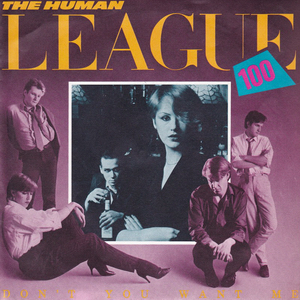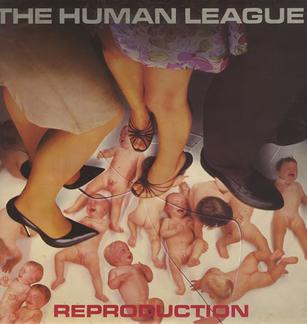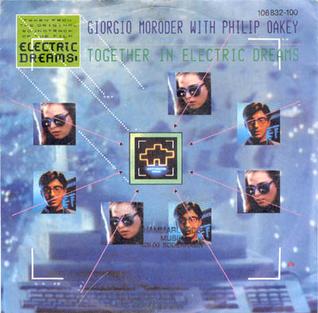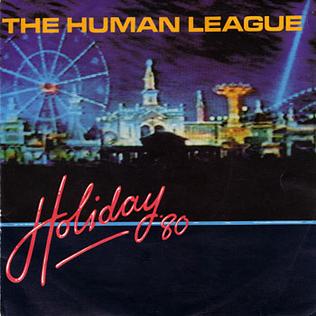
Heaven 17 are an English synth-pop band formed in Sheffield in 1980. The band were a trio for most of their career, composed of founding Human League members Martyn Ware and Ian Craig Marsh (keyboards) with vocalist Glenn Gregory.

The Human League are an English synth-pop band formed in Sheffield in 1977. Initially an experimental electronic outfit, the group signed to Virgin Records in 1979 and later attained widespread commercial success with their third album Dare in 1981 after restructuring their lineup. The album contained four hit singles, including the UK/US number one hit "Don't You Want Me". The band received the Brit Award for Best British Breakthrough Act in 1982. Further hits followed throughout the 1980s and into the 1990s, including "Mirror Man", "(Keep Feeling) Fascination", "The Lebanon", "Human" and "Tell Me When".

Travelogue is the second full-length studio album released by British synth-pop group The Human League, released in May 1980. It was the last album with founding members Ian Craig Marsh and Martyn Ware, as they would leave to form Heaven 17 later that year.

Philip Oakey is an English singer-songwriter who is the frontman and co-founder of the synth-pop band the Human League. Aside from the Human League, he has enjoyed an extensive solo music career and has collaborated with numerous other artists and producers.

Dare is the third studio album by English synth-pop band The Human League, first released in the United Kingdom in October 1981 and then subsequently in the US in mid-1982. The album was produced by Martin Rushent and recorded between March and September 1981, following the departure of founding members Martyn Ware and Ian Craig Marsh, and saw the band shift direction from their previous avant-garde electronic style toward a more pop-friendly, commercial sound led by frontman Philip Oakey.

"Don't You Want Me" is a song by British synth-pop group the Human League. It was released on 27 November 1981 as the fourth single from their third studio album, Dare (1981). The band's best known and most commercially successful song, it was the best selling UK single of 1981, that year's Christmas number one, and has since sold over 1,560,000 copies in the UK, making it the 23rd-most successful single in UK Singles Chart history. It topped the Billboard Hot 100 in the US on 3 July 1982, where it stayed for three weeks.

"Stay with Me Tonight" is a song by English synth-pop band the Human League, released in January 1996 by East West Records as a single from their second compilation album, Greatest Hits (1995). It was jointly written by Philip Oakey and producer Ian Stanley, features lead vocals by Oakey; with backing by co-vocalists Susan Ann Sulley and Joanne Catherall. Post production by re-mixers 'Space Kittens'.

"Human" is a song by English synth-pop band the Human League, released as the lead single from their fifth studio album, Crash (1986). The track, which deals with the subject of infidelity, was written and produced by Jimmy Jam and Terry Lewis. The song topped the charts of the United States, becoming the band's second single to top the Billboard Hot 100 after their 1981 single "Don't You Want Me". It also went to number one in Canada while reaching number five in Germany and number eight in the band's native United Kingdom.

Reproduction is the debut studio album released by the English synth-pop group The Human League. The album was released in 1979 through Virgin Records.

"Tell Me When" is a song by English synth-pop band the Human League, released in December 1994 by East West Records as the first single from their seventh album, Octopus (1995). Written jointly by lead singer Philip Oakey and Paul C. Beckett, the song was produced by Ian Stanley. It peaked at number six on the UK Singles Chart, while reaching number four on the UK Dance Chart. In the US, it peaked at number 31 on the Billboard Hot 100, number 15 on the Billboard Hot Dance Club Play chart and number eight on the Cash Box Top 100. The music video for the song was directed by Andy Morahan and filmed in the Czech Republic.

"Together in Electric Dreams" is a song by the British singer and composer Philip Oakey and Italian composer and producer Giorgio Moroder. It was written by Oakey and Moroder and recorded for the original soundtrack of the film Electric Dreams (1984). It later formed part of the joint album Philip Oakey & Giorgio Moroder, released in 1985.

"Being Boiled" is the debut single by the British synth-pop band the Human League. Composed by Martyn Ware and Ian Craig Marsh, with lyrics by Philip Oakey, it is regarded as a seminal work in early synth-pop.
Ian Craig Marsh is an English musician and composer. He was a founding member of the electronic band the Human League, writing and playing on their first two albums and several singles, until leaving in 1980 to form the British Electric Foundation and later Heaven 17.

"Boys and Girls" is a song by the British synth-pop group The Human League. It was released as a stand-alone single in the UK in February 1981 and peaked at number 48 in the UK Singles Charts. It was written by lead singer Philip Oakey and the band's visual director / keyboard player Philip Adrian Wright.

"The Sound of the Crowd" is a song by the British synth-pop group The Human League. It became the band's commercial breakthrough, reaching #12 on the UK singles chart in May 1981.

"Open Your Heart" is a song by the British synth-pop group The Human League. It was released as a single in the UK in October 1981 and peaked at number six in the UK singles chart. It was written jointly by lead singer Philip Oakey and keyboard player Jo Callis. The song features a lead vocal by Oakey and female backing vocals by Susanne Sulley and Joanne Catherall, analogue synthesizers by Jo Callis, Philip Adrian Wright and Ian Burden. Drum machines, sequencing and programming were provided by producer Martin Rushent.

"Love Action (I Believe in Love)" is a song by the British synth-pop group The Human League, released as a single in the UK in July 1981. It became the band's first Top 10 success, peaking at number three in the UK singles chart.

"I Don't Depend on You" is a disco-influenced song by the British synth-pop group the Human League released under the pseudonym The Men. It was released as a single in the UK in July 1979, but failed to chart. It was written by Philip Oakey, Martyn Ware and Ian Craig Marsh; was produced by Colin Thurston and featured guest backing vocalists Katie Kissoon and Lisa Strike.

Holiday '80 is an EP released by the original line-up of the British synthpop band The Human League. The EP was issued in the UK by Virgin Records in April 1980, a month before the release of the band's second album Travelogue. The EP peaked at no. 56 in the UK Singles Chart in May 1980, but was later reissued and returned to the chart, peaking at no. 46 in February 1982.

"1st Man in Space" is a song by the English electronic music group All Seeing I, based in Sheffield. It was the third single to be released from the album Pickled Eggs and Sherbet (1999).



















